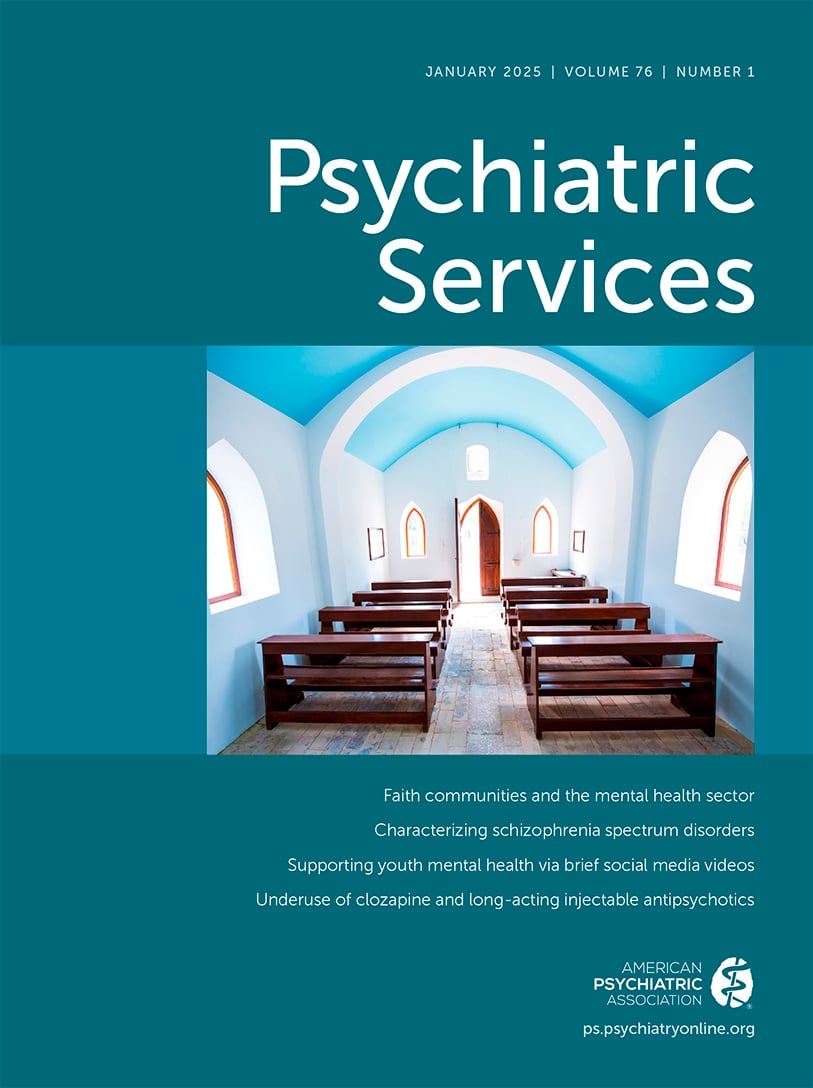Current Issue
- Volume 76
- Number 1
- January 2025
Taking Issue
Articles
Publication date: 23 September 2024
Pages2–12Objective: Current information on treatment and clinical characteristics of U.S. adults with schizophrenia spectrum disorders (i.e., schizophrenia, schizoaffective, and schizophreniform disorders) may help inform public health policy and service ...
https://doi.org/10.1176/appi.ps.20240138Publication date: 14 August 2024
Pages13–21Objective: The authors aimed to examine how certified community behavioral health clinics (CCBHCs) fulfill crisis service requirements and whether clinics added crisis services after becoming a CCBHC. Methods: National survey data on CCBHC crisis services ...
https://doi.org/10.1176/appi.ps.20240152Publication date: 23 September 2024
Pages22–29Objective: This study investigated ICD-10-CM codes for adverse social determinants of health (SDoH) across 12 U.S. health systems by using data from multiple health care encounter types for diverse patients covered by multiple payers. Methods: The authors ...
https://doi.org/10.1176/appi.ps.20240148Publication date: 09 August 2024
Pages30–40Objective: Adults with serious mental illness have high rates of tobacco use disorder and underuse pharmacotherapy for tobacco cessation. In a previous randomized controlled trial, participants receiving community health worker (CHW) support and education ...
https://doi.org/10.1176/appi.ps.20240044Publication date: 10 July 2024
Pages41–48Objective: Digital substance use treatment programs present an opportunity to provide nonresidential care for people with problematic substance use. In June 2021, the provincial government in Ontario provided free access to Breaking Free Online (BFO), a ...
https://doi.org/10.1176/appi.ps.20230427Reviews & Overviews
Publication date: 27 August 2024
Pages49–60Objective: Mindfulness-based interventions are increasingly being used in schools to improve students’ mental, emotional, and behavioral development. Although many mindfulness programs exist, the types of programs that are effective for specific age groups ...
https://doi.org/10.1176/appi.ps.20240027Publication date: 02 October 2024
Pages61–81Objective: Faith communities are increasingly providing services to address the mental health needs of their congregations and communities. However, many feel limited in their capacity to address serious illness and experience challenges to collaborating ...
https://doi.org/10.1176/appi.ps.20240077Brief Reports
Publication date: 27 August 2024
Pages82–85Objective: This study aimed to characterize the perceived priorities of state and county policy makers for youth mental health services and the factors that influence those priorities. Methods: Mental health agency officials (N=338; N=221 state officials, N=...
https://doi.org/10.1176/appi.ps.20230430Publication date: 02 August 2024
Pages86–89Objective: Stigma toward schizophrenia spectrum disorders is pervasive and negatively influences service access and delivery. Cognitive impairment associated with schizophrenia (CIAS) is common, but its association with stigma is unknown. In this study, ...
https://doi.org/10.1176/appi.ps.20240106Open Forum
Publication date: 09 October 2024
Pages90–92Schizophrenia is among the most devastating and costly human diseases. The public face of the failure to appropriately treat schizophrenia includes approximately 100,000 homeless individuals with schizophrenia and related psychoses and 200,000 ...
https://doi.org/10.1176/appi.ps.20240110Datapoints
Technology in Mental Health
Publication date: 10 July 2024
Pages95–98Social media platforms are communication forums with potential benefits and disadvantages for youths’ mental health. In this column, the author focuses on two main themes. First, recognizing the need for carefully crafted interventions, the author ...
https://doi.org/10.1176/appi.ps.20240093Publication date: 28 June 2024
Pages99–101Digital terror refers to the use of digital technology to disseminate graphic images of acts of violence to frighten the public. On October 7, 2023, militants of the Palestinian organization Hamas launched a brutal attack on Israel and used digital terror ...
https://doi.org/10.1176/appi.ps.20240169Law & Psychiatry
Publication date: 19 November 2024
Pages102–104Manufacturers of drugs or devices that are prescribed by physicians are protected by the “learned intermediary rule” from having to disclose risks directly to patients. Instead, they must inform physicians of these risks. But when a company fails to ...
https://doi.org/10.1176/appi.ps.20240518Frontline Reports
Editor’s Choice
Past Issues
View Issues Archive
Vol. 76 | No. 1

Vol. 75 | No. 12

Vol. 75 | No. 11
